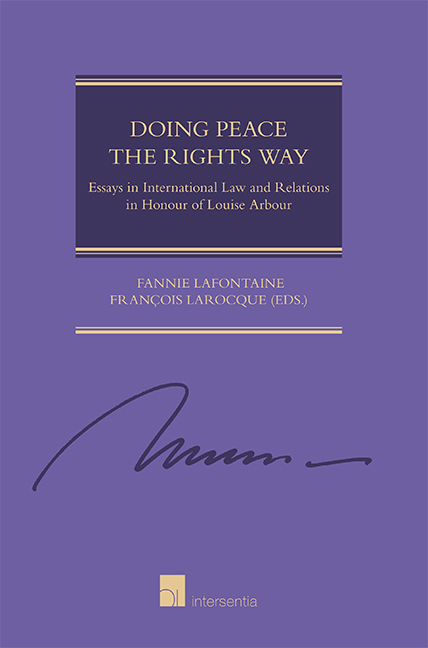Book contents
- Frontmatter
- Foreword
- Contents
- List of Contributors
- Introduction
- PART I OF FREEDOM AND EQUALITY
- Human Rights Obligations for Non-State Actors: Where Are We Now?
- The Right to Truth: When Does it Begin?
- Corruption, Inequality and Boko Haram in Nigeria
- Social and Economic Rights and the Legal Imagination
- Building a Culture of Inclusivity in a Diverse Society
- Made in Canada: A Failed War on Drugs
- Unaccompanied Children Out of Their Country of Origin: Trapped in the Administrative Net
- PART II OF PEACE AND JUSTICE
- PART III OF WOMEN AND LEADERSHIP
- An Interview with the Honourable Madam Justice Louise Arbour
Corruption, Inequality and Boko Haram in Nigeria
from PART I - OF FREEDOM AND EQUALITY
Published online by Cambridge University Press: 13 April 2019
- Frontmatter
- Foreword
- Contents
- List of Contributors
- Introduction
- PART I OF FREEDOM AND EQUALITY
- Human Rights Obligations for Non-State Actors: Where Are We Now?
- The Right to Truth: When Does it Begin?
- Corruption, Inequality and Boko Haram in Nigeria
- Social and Economic Rights and the Legal Imagination
- Building a Culture of Inclusivity in a Diverse Society
- Made in Canada: A Failed War on Drugs
- Unaccompanied Children Out of Their Country of Origin: Trapped in the Administrative Net
- PART II OF PEACE AND JUSTICE
- PART III OF WOMEN AND LEADERSHIP
- An Interview with the Honourable Madam Justice Louise Arbour
Summary
The State social order is founded on ideals of Freedom, Equality and Justice.
In furtherance of the social order –
(a) every citizen shall have equality of rights, obligations and opportunities before the law;
(b) the sanctity of the human person shall be recognised and human dignity shall be maintained and enhanced;
(c) governmental actions shall be humane;
(d) exploitation of human or natural resources in any form whatsoever for reasons, other than the good of the community, shall be prevented; and
(e) the independence, impartiality and integrity of courts of law, and easy accessibility thereto shall be secured and maintained.
Most constitutions in the world have such idealistic words in their preambles and first chapters, but not all of them put such emphasis on social justice and social order. Nigeria is certainly one of the places where the contrast between the sanctity of the principles of equality and justice on the one hand, and the daily reality of extreme inequality and unlimited injustice on the other hand is the most shocking. In the words of Muhammadu Buhari, the former military ruler who was elected as the new President of Nigeria in March 2015: “Together, we co-operated to surprise the world that had come to expect only the worst from Nigeria.” The surprise came from the exceptionally credible and peaceful presidential election, which led to the first-ever democratic alternation of power in the history of Nigeria.
Nigerians, West Africa and the African continent needed good news as bloody conflicts and an upsurge in the number of terrorist acts were casting serious doubts on the recent positive perceptions of economic prospects for the continent. Buhari's election generated an unprecedented wave of hopes throughout Nigeria. But the new president knew that turning around Nigeria might be the most difficult undertaking a leader on the planet could think of. Nigerians unequivocally voted for Buhari and his opposition party because they believed that a new administration could put an end to deadly violence in the country, especially in the north confronted with Boko Haram's campaign of terror, and at the same time aggressively fight a battle against corruption and outrageous economic and social inequalities.
- Type
- Chapter
- Information
- Doing Peace the Rights WayEssays in International Law and Relations in Honour of Louise Arbour, pp. 53 - 64Publisher: IntersentiaPrint publication year: 2019



